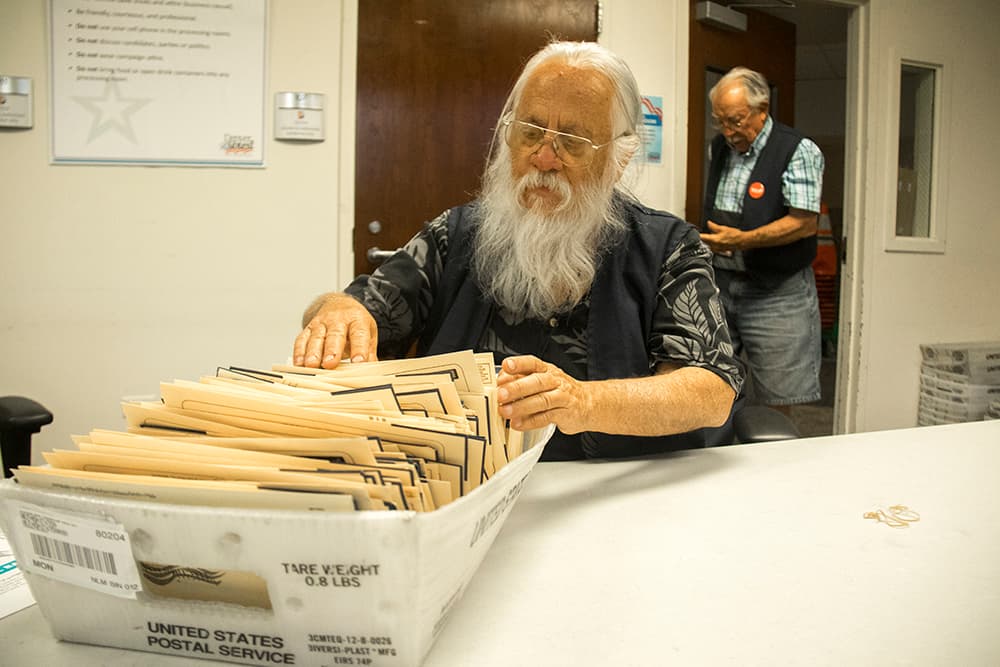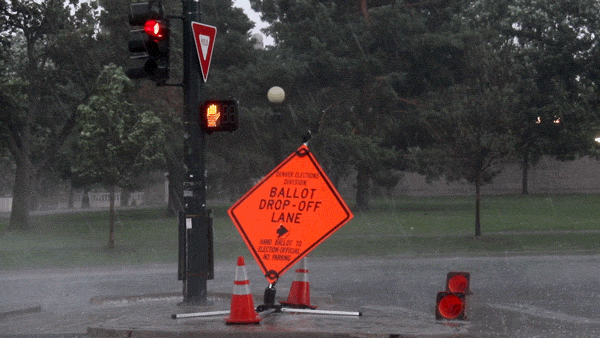
On Tuesday night, El Paso County Commissioner Darryl Glenn emerged victorious from a crowded field of five Republican Senate hopefuls, and local and national political analysts promptly handed the U.S. Senate race to Democratic incumbent Sen. Michael Bennet.
To be fair, they probably would have done that with any Republican winner. Political scientists say Bennet has a "structural" advantage that goes beyond the merits of any individual candidate.
But Glenn defeated long odds to become the Republican candidate, and he's not admitting defeat before he even gets started in on Bennet.
So here's what you need to know:
Who is Darryl Glenn?
Darryl Glenn is an El Paso County Commissioner, attorney and Air Force veteran. While other candidates got on the ballot through a petition process that was plagued by allegations of fraud and legal challenges, Glenn wowed delegates at the state convention with The Speech and eliminated the competition.

He's an "unapologetic Christian constitutional conservative." He won't reach across the aisle, he's said, but will stand on principles.
He has called Trump "patriot" and said Republicans should unite behind their nominee, even as he drew support from prominent members of the #NeverTrump movement.
He's also got some fancy shoes.
What happened on Tuesday?
- Darryl Glenn: 37.6 percent
- Jack Graham: 24.9 percent
- Robert Blaha: 16.9 percent
- Jon Keyser: 12.6 percent
- Ryan Frazier: 8.6 percent
That's as of Tuesday evening, with 304,543 ballots counted.
In a five-way race, that's not even close. The race was called soon after the first results were announced.
The Colorado Independent's Corey Hutchins was at Glenn's victory party at the Broadmoor Hotel in Colorado Springs. Glenn thanked his "statewide team of misfit toys" (that's his campaign volunteers), and then he said he'll focus on re-establishing trust between citizens and public officials.
“What that means is you need to believe in the fact that we can be great,” he said. “I understand right now we’re hearing themes about ‘Let’s make America great’ but the theme of this campaign is ‘It’s time for Colorado to lead.’”
Colorado, Glenn said, is the home of the Taxpayer’s Bill of Rights amendment that limits government spending, and so in the Senate he’ll fight for a balanced-budget amendment.
“There are three things that we are going to continue to focus on. Number one, the defense of this country,” he said, adding that “radical Islamic terrorism must be dealt with and as Americans we must acknowledge it and we must address this enemy.”
Glenn also tried to identify one area of potential common ground as he prepares to enter the general election.
“We do not have a revenue problem, ladies and gentleman, we have a spending problem,” he said. “As Coloradans and as Americans we can work to solve this debt and we can actually fix this problem. It’s going to take commitment. We must first acknowledge that there’s a problem, but then we must develop policies that actually will allow us to fix the problem, because when we work together as Republicans and Democrats, then we will have economic prosperity for each and every one of us.”
Why did Glenn win?
Glenn had almost no money and no name recognition to start with, and he campaigned with an all-volunteer staff. Observers credit his convention speech with immediately raising his profile while placing him on the ballot without any of the controversy that plagued his rivals. He started campaigning earlier than almost anyone else, and he has a knack for grassroots, retail politics. (He's run and won a lot, first for Colorado Springs City Council, then for county commissioner.)

And he drew the support of prominent movement conservatives. He had the backing of the Senate Conservatives Fund, Sarah Palin, Ted Cruz and prominent blogger Erick Erickson. And that support brought outside money and assistance.
What do Democrats think?
They seem absolutely delighted with Glenn as an opponent.
Here's Bennet's campaign on Tuesday night:
The fringe of the Republican Party got their candidate tonight in Darryl Glenn, who might be the most far-right conservative Senate nominee our state has seen in decades. Glenn makes Ken Buck look like a moderate -- he's simply too extreme for Colorado.
The email tied Glenn to Cruz, whom Glenn said he would nominate for the Supreme Court, and to Trump, whom Glenn called a "patriot."
Here is the Colorado Democratic Party. You might notice a theme:
Republicans just nominated a candidate who says Donald Trump is a 'patriot,' thinks Ted Cruz should be the next Supreme Court justice and believes the real problem with Washington is that there is too much bipartisanship between Republicans and Democrats.
Glenn rode the momentum of endorsements from out-of-state extremists ranging from Ted Cruz and Sarah Palin to right-wing special interest groups like the Senate Conservatives Fund and FreedomWorks, to win against an historically weak field. But he will lose to Michael Bennet in November because he is a climate change denier who is tethered to Trump, against fixing our broken immigration system, and even wants to defund Planned Parenthood. Glenn is too extreme for Colorado and will add to the dysfunction of Washington.
Expect to hear this phrase again and again before November: "too extreme for Colorado."
Does any of this matter?
I'm not telling you not to vote in November (you should vote; your vote matters), but political scientists and analysts think Bennet has this race in the bag and that would have been the case regardless of who Republicans selected.
Seth Masket, chair of the political science department at University of Denver, said the biggest disadvantage the Republican has is Trump.
"That’s going to be a vulnerability for the Republican because they’re going to be asked constantly if they agree or disagree with whatever Trump just said," Masket said. "And that's going to be a constant storyline for political reporters because Trump is always saying things."
But beyond that, Colorado's electorate is trending blue. It's increasingly Latino and increasingly young. Those voters have higher turn-out in presidential elections, as do lower-income voters who also favor Democrats. Bennet is an incumbent with a pragmatic reputation who has already survived one challenge.
All of those give Bennet "structural" advantages, said Tony Robinson, chair of the political science department at the University of Colorado-Denver.
"The structural issues are against them, and the Republican Party has already kind of given up on this race," he said.
The Washington Post asked Tuesday night if Republicans have "forfeited" the Senate race.
Political analyst Eric Sondermann said the same qualities that helped Glenn electrify Republican primary voters will work against him in November.
"He's the most ardent, take no prisoners conservative in a very conservative party," he said. "What gets out the vote in the primary does not help you in the general."
"Darryl Glenn wakes up tomorrow with the deck stacked against him."












